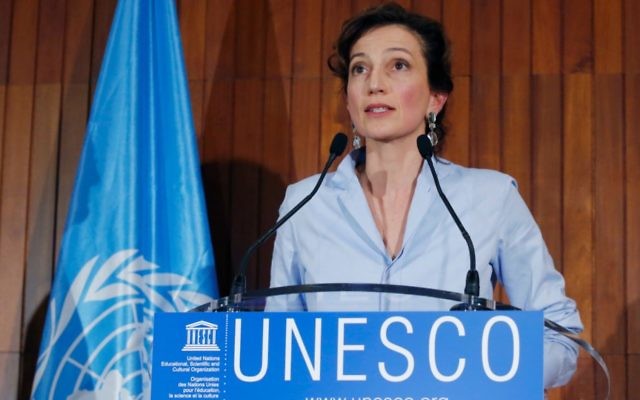US pulls out of UNESCO, Israel set to follow
Israel has applauded America for leaving a UN agency that has become notorious for criticising the Jewish State and downplaying Jerusalem's Jewish history.
ISRAEL has applauded America for leaving a United Nations agency that has become notorious for criticising the Jewish State and downplaying Jerusalem’s Jewish history.
The US State Department has announced that America will quit the UN’s cultural agency UNESCO next year, in part because of its “continuing anti-Israel bias”.
UNESCO has passed various resolutions that lambast Israel, and some in particular have provoked anger among Israelis and Diaspora Jews, such as the July resolution that recognised Hebron’s old city and the Tomb of the Patriarchs as Palestinian heritage sites.
Last year it passed resolutions that airbrushed away Jewish connections to Jerusalem.
America’s UNESCO exit reflects a “courageous and ethical decision”, Israel’s Prime Minister Benjamin Netanyahu declared, reasoning that “UNESCO has become a theatre of the absurd and instead of preserving history, distorts it.”
This isn’t the first time that America’s backing for Israel has impacted its UNESCO policies. Until 2011, Washington footed 22 per cent of UNESCO’s budget, but cut funds when the agency infuriated Jerusalem by recognising Palestinian statehood.
At this week’s cabinet meeting, Netanyahu said that Israel is set to follow America’s latest move.
“Last week I instructed the Foreign Ministry to prepare for Israel’s withdrawal from UNESCO, which has become a platform for delusional, anti-Israeli and – in effect – anti-Semitic decisions,” he said.
“We hope that the organisation will change its ways but we are not pinning hopes on this. Therefore, my directive to leave the organisation stands and we will move forward to carry it out.”
But some key Jewish voices on UNESCO think that America and Israel are being short-sighted, and need to keep their influence at the agency to stop it from becoming more extreme.
“Now is not a time for democracies to abandon UNESCO,” said Shimon Samuels, the only representative of a Jewish organisation accredited to UNESCO’s World Heritage Committee.
Samuels, international director for the Simon Wiesenthal Centre, said that if democracies leave, “their departure will leave a vacuum rapidly filled by the enemies of freedom”.
He believes that recent developments at UNESCO underscore the need for US and Israeli involvement.
Last week Qatar, a longstanding foe of Israel and a state widely accused of supporting terrorism, was looking likely to have its candidate chosen to become UNESCO’s new leader. In the end, a Jewish candidate from France, Audrey Azoulay, won the election instead.
But she won by only two votes, with 28 states backing the Qatari candidate. “For the moment, UNESCO is saved from a Qatarstrophe, and that success must now be defended,” said Samuels.
Azoulay, a former minister of culture in the French government, was born in Morocco, where her father is one of the most influential members of the Jewish community. Andre Azoulay is an adviser to the King.
After her win – which must be ratified by UNESCO’s General Assembly next month before she takes office – she made brief comments and appeared to refer to the agency’s financial difficulties and ideological conflicts.
She said: “In this moment of crisis, I believe we must invest in UNESCO more than ever, look to support and reinforce it, and to reform it. And not leave it.”
Australian Foreign Minister Julie Bishop said she shared Samuels’ view that UNESCO’s anti-Israel bias was best tackled from within the organisation.
Expressing concern over the “the persistent and consistent targeting of Israel” and stressing that “resolutions that target only Israel are not fair, are not balanced and should not be supported”, she told Sky News, “Our view is to try and effect change from within the membership of UNESCO and other organisations.”
NATHAN JEFFAY


comments